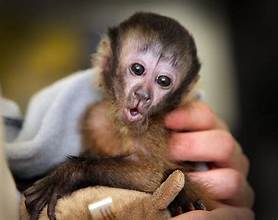Primates, intelligent, expressive, and often surprisingly affectionate, have long fascinated humans. For some people, especially families exploring unique emotional connections or alternative support animals, the idea of raising a primate may sound appealing.
But before you imagine a cuddly monkey sitting beside your child, it’s essential to dive into the facts, responsibilities, and ethical questions involved.
We will explore whether raising a primate is a good fit for your family, especially if you have a child with special needs or are considering alternatives to traditional therapy animals.
🧠 Can Primates Serve as Support Animals?
While dogs are the most common therapy and service animals, some people ask: Can monkeys serve the same role?

The answer is nuanced. In rare cases, capuchin monkeys have been trained to assist individuals with mobility impairments by retrieving dropped items, opening doors, or turning on lights. However, primates are not recognized as service animals under the ADA (Americans with Disabilities Act). Most primate-related assistance is highly specialized and not legally protected in the same way as dogs are.
Additionally, emotional support animals (ESAs), which don’t require special training, can be of any species. Still, primates come with far more complications than more typical animals like dogs, cats, or rabbits.
🏡 Is a Primate a Good Fit for Families with Special Needs?
This is where things get serious.
Primates are not domesticated animals. They have complex social, psychological, and physical needs. Many develop behavioral issues when kept as pets, primarily when raised without the presence of other primates. For families with special needs children, this could introduce stress or even safety concerns.

Before considering a primate:
- Ask yourself: Can I meet the needs of an animal with the emotional capacity of a toddler, but one that never grows up?
- Would introducing a non-domesticated animal disrupt routines important to a child with autism or sensory sensitivities?
- Do I have the time and financial resources to care for an exotic animal properly?
📋 Legal & Ethical Considerations
In many U.S. states, it’s either illegal or tightly regulated to own a primate. Even where legal, permits are required, and liability risks are high. Some primates have been known to lash out when scared or stressed, even with owners they trust.
Families must also consider the ethical issue of removing primates from natural or sanctuary environments, where they thrive among others of their kind.
🐾 Safer Alternatives for Support & Emotional Bonding
If your goal is to find an emotional support animal for your child, consider the following alternatives:
- 🐶 Therapy Dogs: Specially trained to calm, assist, and connect with individuals of all ages.
- 🐱 Comfort Cats: Ideal for quiet, calming companionship.
- 🐰 Rabbits or Guinea Pigs: Excellent choices for sensory-sensitive children.
- 🦜 Birds: Engaging and colorful companions that can also aid in speech development.
If your child is fascinated by monkeys or other exotic animals, consider therapeutic animal interaction programs or virtual educational experiences offered by sanctuaries or zoos.
💡 Real-Life Learning Opportunity: Visit, Don’t Own
Encourage your child’s love for primates by visiting:
- Accredited zoos and wildlife sanctuaries
- Primate rescue organizations that offer educational tours
- Online learning platforms with live streams of primates in natural settings
This offers the emotional connection and learning without the safety or ethical concerns.
📚 Final Thoughts: What Raising a Primate Requires
Raising a primate is a lifelong commitment, often 25+ years, with complex emotional, dietary, and medical needs. They are not replacements for trained therapy animals. While the idea may be tempting, most experts advise against keeping primates in private homes, especially in households with children or vulnerable individuals.
Instead, let your child’s curiosity flourish through education, enrichment, and ethical experiences with animals that suit your family’s unique needs.




